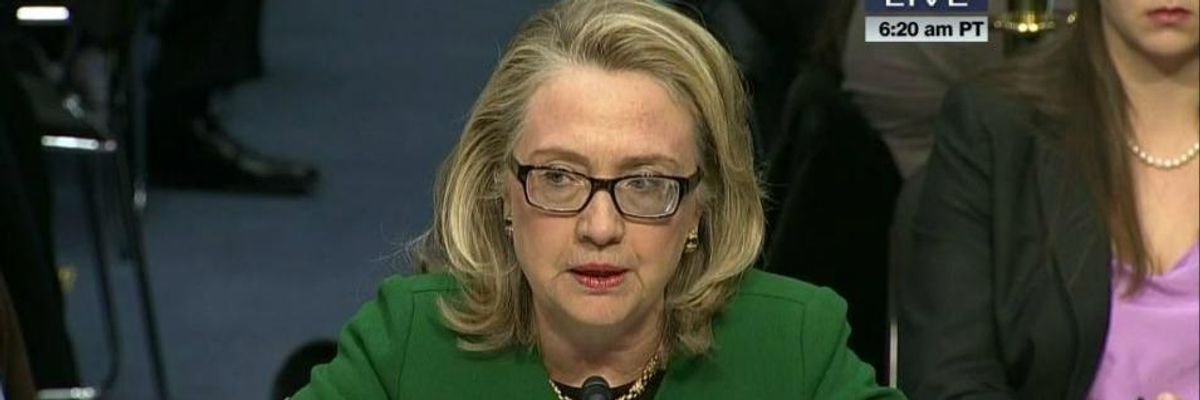That sound you hear?
That's Republicans dancing a merry jig, and Benghazi investigators sharpening their subpoenas, because 2016 just got a lot more interesting with the revelation that as Secretary of State, Hillary Clinton conducted all official business using a personal email account on her own web domain.
Here's what happened, and why it matters. A lot.
What Happened
Hillary Clinton exclusively used a personal email account to conduct government business as secretary of state, violating federal regulations that officials' correspondence be retained as part of the agency's record and thus subject to Freedom of Information Act and Congressional requests. Clinton did not have a government email address during her entire four-year tenure, and her aides took no actions to have her personal emails preserved at the time, as required by the Federal Records Act.
It was only two months ago, in response to a new State Department effort to comply with federal record-keeping practices, that Clinton's personal advisers reviewed tens of thousands of pages of her emails and decided which ones to turn over to the State Department. All told, 55,000 pages of emails were given to the Department. The contents of the rest are known only to Clinton insiders. The process Clinton's advisers used to determine which emails related to her work at the State Department were turned over has not been explained.
Instead, Clinton appears to have used email service through her own domain, clintonemail.com. The domain was created on January 13, 2009, just before Obama was sworn into office, and the same day that Clinton's confirmation hearings began before the Senate.
In March 2013, an adviser to Clinton, Sidney Blumenthal, had his e-mail through the clintonemail.com domain hacked.
The Clinton email domain is officially registered to a Jacksonville, Florida company called PERFECT PRIVACY, LLC. The company advertises itself by saying "By signing up for Perfect Privacy when you register your domain, our information is published in the WHOIS database, instead of yours." That means Perfect Privacy acts as a cut-out, hiding the actual person or organization that set up the domain by sticking its own information online instead.
Clinton as Secretary of State held herself to lower standards than the rank and file. According to eight pages of State Department regulations (5 FAM 440, 443.1), "All Government employees and contractors are required by law to make and preserve records containing adequate and proper documentation of the organization, functions, policies, decisions, procedures, and essential transactions of the agency (Federal Records Act, or "FRA," 44 U.S.C. 3101 et seq)."
It is also apparent no one at State raised any questions. A large number of IT staff must have been aware that Clinton had no official email address, as must have security staff. Everyone who traded email with Clinton also knew. And no one said anything.
Why It Matters
The most basic reason this all matters is because it is the law. As Secretary of State, Clinton was required to maintain her emails as official records. She did not.
It also matters because Clinton's email actions were deliberate, and included an effort to hide what she was doing. Her email domain was registered in a way to hide its actual ownership (still unknown), and was set up just as she re-entered public life. Clinton never disclosed the email account until the New York Times learned of it. That lack of disclosure continued even as she testified about the tragedy in Benghazi, assuring the public her Department's internal review represented the full story.
That review clearly did not represent the full story, in that it did not include any of Clinton's emails. The review also did not note that the documents it had access to somehow did not include any emails from the Secretary of State. A careful analysis of Clinton's testimony on Benghazi will need to be made to look for signs of possible perjury.
The contents of whatever small portion of Clinton emails released to State, and questions about what is in the tens of thousands of pages withheld, will revive hearings into what happened in Benghazi and what role Clinton played. There remain questions about what information was withheld from Congress. Even of the thousands of pages State received from Clinton, only 900 have been turned over to Congress.
Use of personal email to conduct government business in the age of hacking raises serious security questions, and calls into question Clinton's commitment to protecting America's secrets. With no oversight, the only check on Clinton not discussing classified information in her emails was Clinton herself. "We have no indication that Secretary Clinton used her personal e-mail account for anything but unclassified purposes," State Department deputy spokesperson Marie Harf said Tuesday. "While Secretary Clinton did not have a classified e-mail system, she did have multiple other ways of communicating in a classified manner (assistants printing documents for her, secure phone calls, secure video conferences)." Of course, since no one at State has seen the bulk of Clinton's emails, they indeed may have "no indication."
2016 just got much more interesting. Republicans will raise the email issue in great detail, especially since Jeb Bush has already released his own email stash from his time as governor. Clinton does not seem prepared to address the question; her spokesperson said incongruously that her use of a personal email account was in compliance with the "letter and spirit of the rules."
Clinton as a leader allowed herself to be held to lower standards than that of her own rank and file. This, along with the decision to hide the emails itself and the violations of law, will raise questions about what type of president she might make.
But hey, as people say, "if you have nothing to hide, you have nothing to fear."
